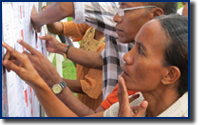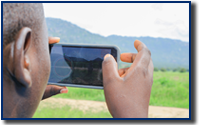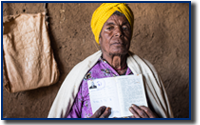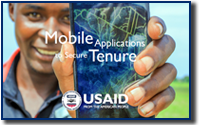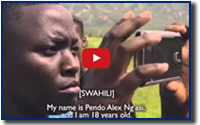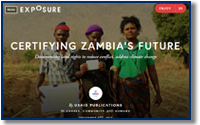Every year, the World Bank Conference on Land and Poverty brings together representatives from governments, the development community, civil society, academia, and the private sector to discuss issues of concern to communities, land practitioners and policymakers worldwide. The growing importance of this event highlights the increasing recognition that clear, secure land rights are central to alleviating poverty, promoting economic development, improving food security, limiting conflicts, and increasing stability.
At this year’s conference, USAID will be highlighting new research, technologies and tools that focus on three key themes:
- Strengthening customary tenure systems
- Using innovative mobile applications to secure land rights and improve land management
- Improving evidence-based programming in the land sector through rigorous impact evaluations
You can also learn more about each of these issues and access research and resources below.
Through pilot programs, research, and evaluations, USAID is developing practical tools and methods to strengthen community tenure systems. View research, case studies, success stories and other resources on community tenure.
Learn how USAID is developing and testing technologies to make it easier for governments and local communities to more easily map, document, and maintain records of land rights and improve sustainable land management.
There is a growing body of evidence that suggests that stronger land tenure security has a positive impact on important development outcomes. View survey designs and tools being used in impact evaluations in Ethiopia, Guinea, Liberia, and Zambia.
USAID has developed a suite of low-cost, open-source Mobile Applications to Secure Tenure (MAST), that help people and communities secure rights—whether customary or formal—to their most important asset: land.
View the brochure »
In Tanzania, USAID trains youth to map and record rural land rights with an easy-to-use smartphone app—MAST.
Watch the video »
A photo essay on using mobile technology to document customary land rights to reduce conflict, address climate change.
View the gallery »
Tuesday Presentations
- Lessons Learned from CSO-led Systematic Registration of Customary Land in Zambia
- Improving Security of Rights to Resources Through Participatory Rangeland Management in Ethiopia
Wednesday Presentations
- The Role of Land Policy in Agricultural Transformation and Inclusive Economic Growth: Implications for Africa
- The Implementation of Rwanda’s Expropriation Law and its Outcomes on the Population
- Does Secure Community Forest Tenure Affect Forest Condition? New Pre-Treatment Evidence From a Quasi-Experimental Evaluation of a REDD+ Project in Zambia
- Insights from Rwanda: Analysis of a Land Conflict Resolution Project in Eastern Province
- Land and Rural Development Policy Reforms in Colombia: The Path to Peace
- Artisanal and Small-Scale Mining (ASM) Governance and Customary Tenure Institutions: Practices and Outcomes in Guinea
Thursday Presentations
- MAST: Performance Evaluation of Mobile Application to Secure Tenure Pilot
- Documenting Customary Land Rights in Zambia: A Low-Cost Open Source Approach
- To What Extent Does Tenure Security Shape Agroforestry Investment and Impacts on Agriculture and Livelihoods in Strong Customary Land Systems? Evidence from Early Agroforestry Adopters in Zambia’s Eastern Province
- The Duality of Local Resource Governance in Rural Liberia: Evidence Using Multiple Types of Data


